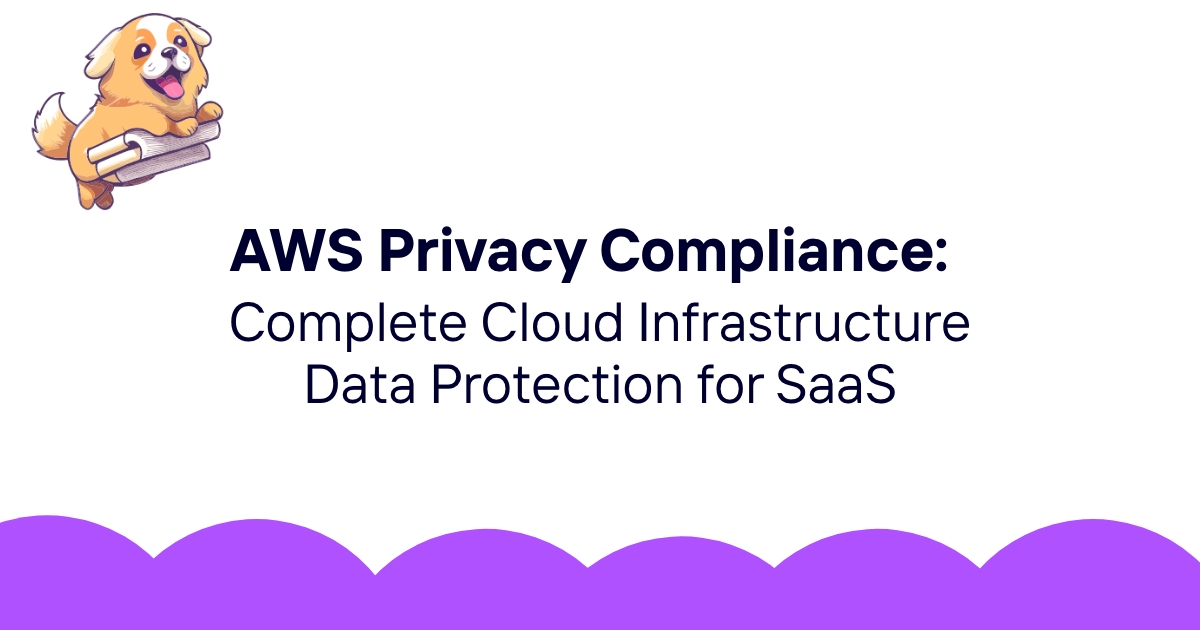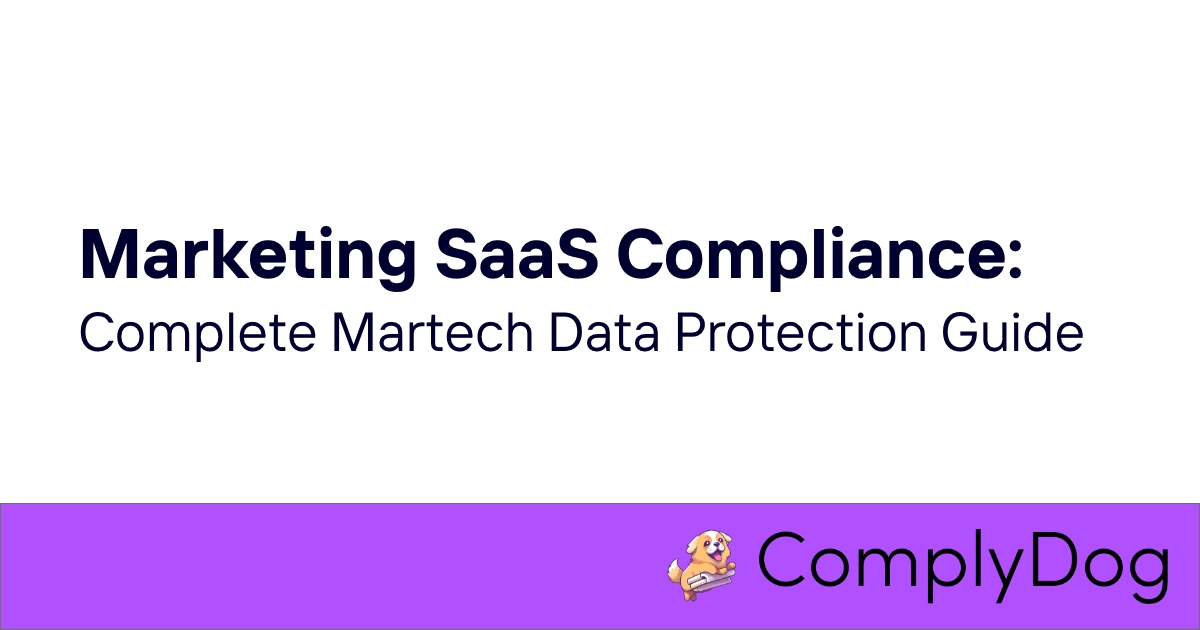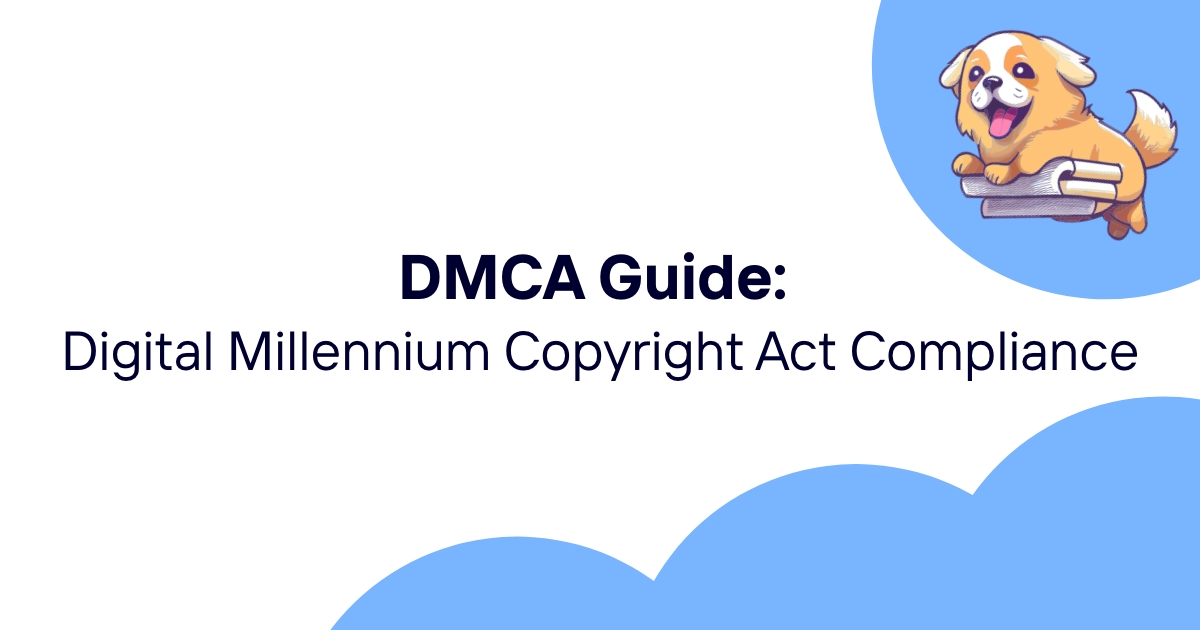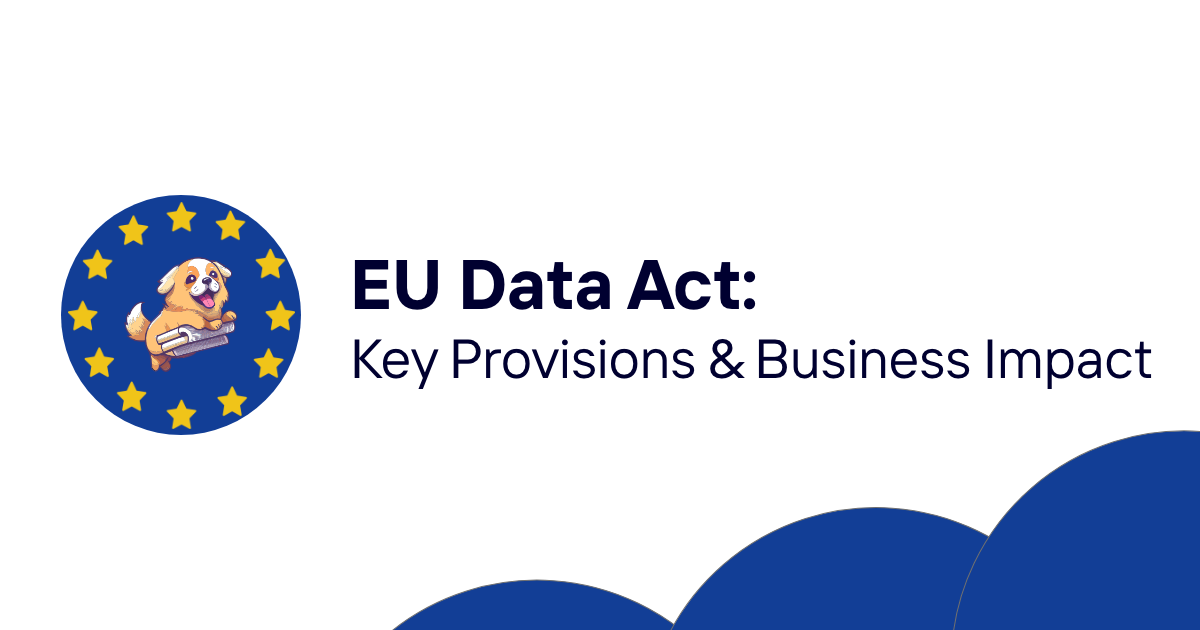AWS cloud infrastructure forms the foundation for privacy compliance in most SaaS applications, making proper configuration and management absolutely critical for organizations serving global markets under regulations like GDPR, CCPA, and other international privacy laws. While AWS provides extensive privacy and security services, achieving comprehensive compliance requires understanding the shared responsibility model and implementing appropriate technical and organizational measures.
The complexity of AWS privacy compliance lies in the shared responsibility model where AWS manages security "of" the cloud while customers remain responsible for security "in" the cloud, including data protection, access controls, encryption implementation, and privacy compliance for applications and data processing activities.
AWS infrastructure processes personal data through virtually every service including compute instances, databases, storage systems, analytics platforms, and machine learning services that each create specific privacy considerations and configuration requirements for SaaS companies serving regulated markets.
SaaS companies using AWS must navigate the intersection of cloud infrastructure management, application-level privacy controls, and regulatory compliance while maintaining scalable architecture that supports business growth without compromising privacy protection or creating compliance gaps.
Proper AWS privacy implementation requires coordinated configuration of data residency controls, encryption services, access management, compliance monitoring, and architectural design that ensures personal data protection throughout the cloud infrastructure stack.
ComplyDog helps SaaS companies implement comprehensive AWS privacy compliance through systematic infrastructure assessment, automated compliance monitoring, and integrated privacy architecture that addresses the full complexity of cloud-based data protection.
AWS Shared Responsibility Model for Privacy
Understanding AWS's shared responsibility model is crucial for implementing comprehensive privacy compliance because it defines where AWS responsibilities end and customer privacy obligations begin throughout cloud infrastructure operations.
AWS Infrastructure Privacy Responsibilities:
AWS manages privacy and security responsibilities for the underlying cloud infrastructure including physical security, network controls, hypervisor management, and service availability that provide the foundation for customer privacy implementations.
AWS implements comprehensive security controls for data centers, network infrastructure, and service platforms while providing customers with privacy-enabling services and features that support regulatory compliance and data protection requirements.
Customer Privacy Implementation Responsibilities:
SaaS companies remain responsible for privacy compliance within their AWS environment including data classification, encryption implementation, access controls, privacy policy compliance, and data subject rights management for applications and data processing.
Implement privacy controls that address customer responsibilities while leveraging AWS privacy-enabling services through appropriate configuration, monitoring, and ongoing management of privacy protection measures.
Service-Specific Responsibility Boundaries:
Different AWS services have varying responsibility boundaries for privacy compliance, requiring understanding of specific service models and privacy implications for storage, compute, database, and analytics services used in SaaS architectures.
Evaluate privacy responsibilities for each AWS service used in your SaaS infrastructure while ensuring appropriate privacy controls are implemented at each layer of the technology stack.
Compliance Coordination Between AWS and Customers:
Effective privacy compliance requires coordination between AWS infrastructure protections and customer privacy implementations through appropriate service configuration, monitoring, and compliance demonstration activities.
Design privacy architecture that leverages AWS compliance capabilities while implementing customer-specific privacy controls that address application requirements and regulatory obligations.
Documentation and Accountability:
Document the division of privacy responsibilities clearly while maintaining accountability for customer privacy obligations and demonstrating compliance through appropriate evidence collection and regulatory reporting.
For insights on implementing privacy controls across complex technical infrastructure, check out our Zoom privacy compliance guide which addresses similar multi-component privacy challenges.
AWS Data Processing Addendum and GDPR
AWS provides comprehensive Data Processing Addendum (DPA) that defines privacy responsibilities and compliance commitments for customer data processing through AWS services under GDPR and other international privacy regulations.
AWS DPA Scope and Coverage:
The AWS DPA covers personal data processing through AWS services while defining AWS as a data processor for customer data and establishing appropriate safeguards for international data transfers and privacy protection.
Review the AWS DPA carefully to understand how it addresses your specific SaaS use cases while ensuring your privacy policies and customer agreements align with AWS privacy commitments and processing limitations.
GDPR Compliance Commitments:
AWS provides specific GDPR compliance commitments including appropriate technical and organizational measures, international transfer safeguards, and support for customer compliance obligations including data subject rights and regulatory reporting.
Leverage AWS GDPR commitments while implementing customer-specific privacy controls that address application-level privacy requirements and regulatory obligations beyond infrastructure protection.
Data Subject Rights Support:
AWS provides tools and capabilities that support customer compliance with data subject rights including data export, deletion assistance, and access logging that facilitate privacy compliance for SaaS applications.
Configure AWS services to support data subject rights processing while implementing application-level controls that provide comprehensive rights management across the entire SaaS platform and data processing workflow.
International Transfer Safeguards:
AWS implements appropriate safeguards for international data transfers including standard contractual clauses and adequacy mechanisms that support global SaaS operations while maintaining privacy compliance.
Document international transfer arrangements with AWS while ensuring customer privacy policies accurately reflect transfer safeguards and geographic data processing that occurs through cloud infrastructure.
Compliance Monitoring and Reporting:
AWS provides compliance monitoring capabilities and reporting that support customer privacy compliance demonstration while enabling ongoing assessment of privacy protection effectiveness.
Implement compliance monitoring that coordinates AWS infrastructure protections with application-level privacy controls while providing comprehensive privacy compliance reporting for regulatory accountability.
SaaS Data Residency and Location Controls in AWS
AWS data residency and location controls enable SaaS companies to meet specific geographic requirements for personal data processing while maintaining global cloud infrastructure benefits and operational efficiency.
AWS Regional Data Residency:
AWS regions provide data residency controls that enable SaaS companies to keep personal data within specific geographic boundaries while leveraging global cloud infrastructure for non-personal data processing and system redundancy.
Configure AWS regional deployment that meets data residency requirements while maintaining application performance and availability through appropriate geographic distribution and service selection.
Availability Zone Data Placement:
AWS Availability Zones within regions provide additional data placement controls that support high availability while maintaining data residency compliance for personal data processing and storage requirements.
Design multi-AZ architecture that provides resilience while ensuring personal data remains within required geographic boundaries through appropriate service configuration and data placement strategies.
Service-Specific Location Controls:
Different AWS services provide varying levels of data location control, requiring understanding of geographic processing implications for storage, compute, database, and analytics services used in SaaS architecture.
Evaluate data location implications for each AWS service while ensuring personal data processing complies with residency requirements through appropriate service selection and configuration.
Content Delivery and Edge Locations:
AWS CloudFront and edge locations create global data distribution that must be managed carefully to ensure personal data processing complies with residency requirements while maintaining content delivery performance.
Configure content delivery that provides global performance while ensuring personal data processing complies with geographic restrictions through appropriate cache configuration and content classification.
Backup and Disaster Recovery Geographic Controls:
AWS backup and disaster recovery services must maintain data residency compliance while providing business continuity capabilities that support SaaS availability and data protection requirements.
Implement backup and recovery strategies that maintain geographic compliance while providing necessary business continuity through appropriate service configuration and data replication controls.
AWS Encryption and Data Protection Services
AWS provides comprehensive encryption and data protection services that enable SaaS companies to implement privacy-compliant data protection throughout cloud infrastructure while maintaining performance and operational efficiency.
AWS Key Management Service (KMS):
AWS KMS provides centralized encryption key management that supports privacy compliance through customer-controlled encryption while integrating seamlessly with AWS services used in SaaS architectures.
Configure KMS to provide appropriate encryption key management while ensuring customer control over encryption keys and compliance with privacy requirements for personal data protection.
Encryption at Rest Implementation:
AWS provides encryption at rest capabilities across storage, database, and analytics services that protect personal data throughout the cloud infrastructure while maintaining service performance and functionality.
Implement encryption at rest that provides comprehensive personal data protection while ensuring appropriate key management and access controls for encrypted data throughout the SaaS infrastructure.
Encryption in Transit Configuration:
AWS encryption in transit protects personal data during transmission between services, applications, and external systems while maintaining communication security and privacy compliance throughout data flows.
Configure encryption in transit that provides comprehensive protection for personal data movement while ensuring appropriate certificate management and secure communication protocols.
AWS CloudHSM for Enhanced Security:
AWS CloudHSM provides dedicated hardware security modules that support enhanced encryption requirements for highly sensitive personal data processing in regulated SaaS environments.
Evaluate CloudHSM for enhanced encryption requirements while balancing security benefits with operational complexity and cost considerations for personal data protection.
Database Encryption and Protection:
AWS database services provide comprehensive encryption capabilities that protect personal data in relational, NoSQL, and analytics databases while maintaining query performance and application functionality.
Implement database encryption that provides appropriate personal data protection while ensuring application performance and query functionality through optimized encryption configuration and key management.
AWS Identity and Access Management for Privacy
AWS Identity and Access Management (IAM) provides foundational privacy protection through access controls that ensure only authorized personnel can access personal data throughout cloud infrastructure and SaaS applications.
IAM Privacy Best Practices:
Implement IAM configurations that support privacy compliance through least privilege access, role-based permissions, and comprehensive access logging that protect personal data from unauthorized access and processing.
Design IAM policies that provide necessary access for business operations while implementing privacy protection through appropriate permission boundaries and access controls for personal data processing.
Service-Linked Roles and Privacy:
AWS service-linked roles provide automated permissions for AWS services while requiring privacy consideration to ensure service access to personal data aligns with processing purposes and privacy policies.
Configure service-linked roles that provide necessary functionality while ensuring automated service access to personal data complies with privacy requirements and processing limitations.
Cross-Account Access and Privacy Controls:
Multi-account AWS architectures require privacy-aware access controls that protect personal data across account boundaries while supporting business operations and organizational separation requirements.
Implement cross-account access that maintains privacy protection while supporting business needs through appropriate permission management and data access controls across organizational boundaries.
IAM Access Logging and Monitoring:
AWS CloudTrail and IAM access logging provide comprehensive audit capabilities that support privacy compliance monitoring and incident response for personal data access and processing activities.
Configure access logging that provides privacy compliance support while enabling ongoing monitoring of personal data access and appropriate incident response for unauthorized access attempts.
Temporary Access and Privacy Protection:
AWS temporary access mechanisms including assumed roles and federated access must maintain privacy protection while supporting operational efficiency and external access requirements for business operations.
Design temporary access that provides necessary operational flexibility while ensuring personal data protection through appropriate access controls and monitoring for time-limited access grants.
AWS Compliance Services and Certifications
AWS provides extensive compliance services and certifications that support SaaS privacy compliance while demonstrating infrastructure protection and regulatory alignment for privacy regulations and industry standards.
AWS Compliance Reports and Certifications:
AWS maintains comprehensive compliance certifications including SOC reports, ISO certifications, and privacy-specific attestations that support customer compliance demonstration and regulatory reporting requirements.
Leverage AWS compliance certifications while implementing customer-specific compliance controls that address application-level privacy requirements and regulatory obligations beyond infrastructure protection.
AWS Artifact for Compliance Documentation:
AWS Artifact provides centralized access to compliance reports and certifications that support privacy compliance documentation and regulatory reporting for SaaS companies serving regulated markets.
Use AWS Artifact to access compliance documentation while maintaining customer-specific compliance records that address application privacy requirements and regulatory obligations.
AWS Config for Compliance Monitoring:
AWS Config provides configuration monitoring and compliance assessment that supports privacy compliance through automated rule evaluation and configuration drift detection for privacy-sensitive services.
Configure AWS Config to monitor privacy-relevant configurations while implementing automated remediation for configuration changes that might impact privacy protection or compliance requirements.
AWS Security Hub for Integrated Compliance:
AWS Security Hub provides integrated security and compliance monitoring that supports privacy compliance through centralized finding management and compliance standard assessment.
Implement Security Hub for privacy compliance monitoring while integrating with application-level privacy controls and monitoring systems that address comprehensive privacy protection requirements.
Third-Party Compliance Validation:
AWS supports third-party compliance validation through penetration testing permissions and security assessment capabilities that enable comprehensive privacy compliance validation for SaaS applications.
Coordinate third-party privacy assessments with AWS infrastructure testing while ensuring comprehensive evaluation of privacy protection across cloud infrastructure and application layers.
SaaS Privacy Architecture on AWS
Designing privacy-compliant SaaS architecture on AWS requires coordinated implementation of data protection controls, privacy-enabling services, and compliance monitoring throughout cloud infrastructure and application layers.
Privacy-First Architecture Design:
Design SaaS architecture that implements privacy protection from the foundation through appropriate service selection, data flow design, and privacy control integration that supports comprehensive data protection.
Implement architecture patterns that provide privacy by design while maintaining scalability and performance through appropriate AWS service configuration and privacy control integration.
Data Classification and Protection Architecture:
Implement data classification architecture that identifies personal data throughout SaaS systems while applying appropriate protection measures based on data sensitivity and regulatory requirements.
Design classification systems that provide automated personal data identification while implementing corresponding protection measures through AWS security services and application-level controls.
Microservices Privacy Boundaries:
Microservices architecture on AWS requires privacy boundary design that protects personal data across service boundaries while maintaining application functionality and performance.
Implement microservices privacy controls that provide data protection while supporting service communication and business functionality through appropriate boundary design and access controls.
Serverless Privacy Implementation:
AWS serverless services require specific privacy considerations for data processing, function boundaries, and event-driven architecture that processes personal data through Lambda functions and managed services.
Configure serverless privacy protection that addresses function-level data processing while ensuring comprehensive privacy protection across event-driven architecture and managed service integration.
Container Privacy Architecture:
Containerized SaaS applications on AWS require privacy protection through container security, orchestration controls, and service mesh configuration that protects personal data throughout container lifecycle management.
Implement container privacy architecture that provides data protection while maintaining container benefits through appropriate security configuration and privacy control integration.
Privacy Compliance Automation:
Automate privacy compliance monitoring and control implementation through AWS automation services while ensuring ongoing privacy protection and regulatory compliance throughout SaaS operations.
Design compliance automation that provides systematic privacy protection while reducing operational overhead through automated control implementation and compliance monitoring.
Ready to build privacy-compliant SaaS infrastructure? Use ComplyDog and transform AWS cloud architecture from privacy challenge to competitive advantage through comprehensive privacy protection that scales with business growth while maintaining regulatory compliance.


















